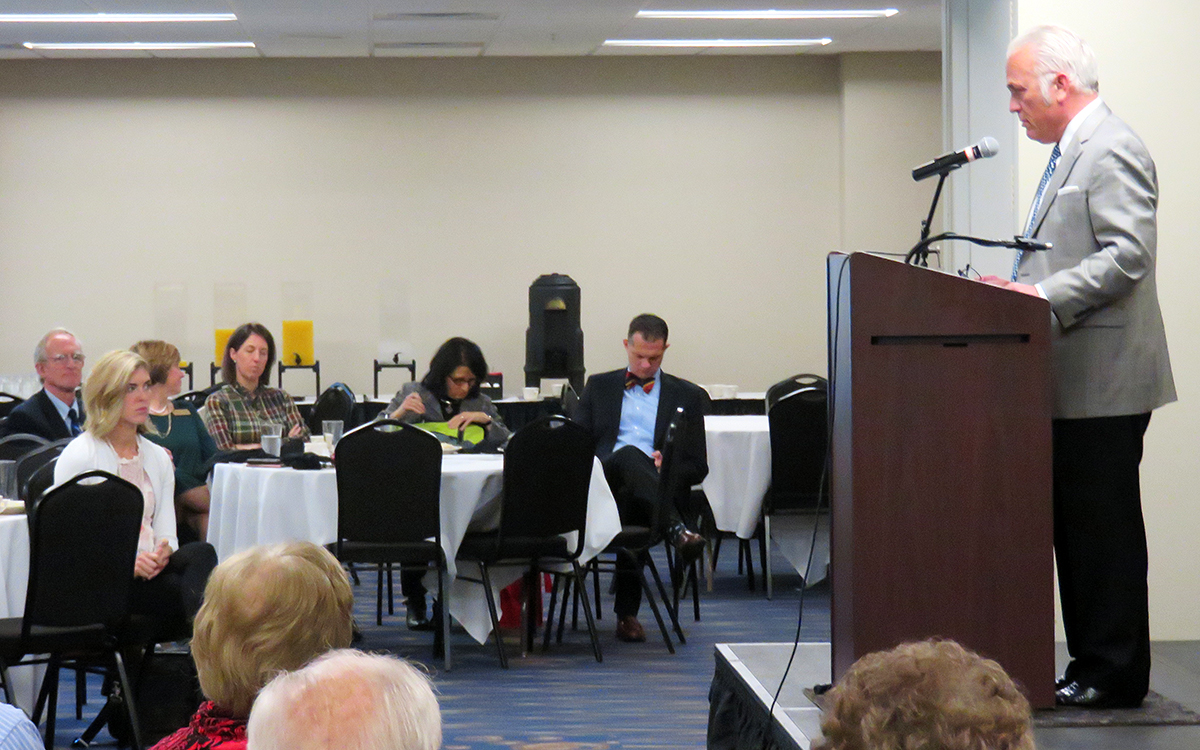Pastors for Texas Children Become a Rising Voice Against School Vouchers
By John Savage
Reporting Texas

Rev. Charles Foster Johnson, the executive director of Pastors for Texas Children, a multi-denominational network of about 2,000 church leaders around the state who work to support public schools, speaks to Baptist pastors in Waco this November. John Savage/Reporting Texas
“We’ve got a God-given responsibility to maintain and keep this public trust, to protect public schools,” Rev. Charles Foster Johnson bellowed at several dozen pastors, snapping them to attention as they ate breakfast.
Johnson, 59, is the Fort Worth-based executive director of Pastors for Texas Children, a network of about 2,000 church leaders around the state who work to support public schools.
Johnson and his group have emerged as chief adversaries of Lt. Gov. Dan Patrick. Patrick champions a breed of education reform forged around vouchers — which steer money from public schools to parents to pay private school tuition.
“The lieutenant governor said, a couple of weeks ago, he’ll keep bringing it up until it passes,” Foster told the pastors, who were gathered for a meeting of Texas Baptists Committed in Waco. “It’s up to us to stop him.”
In his baritone southern drawl, Johnson told the pastors that vouchers siphon funds from schools in low-income neighborhoods and violate the separation of church and state enshrined in the First Amendment. School vouchers contradict God’s law of religious liberty, he said, by providing government support for religion.
The organization’s mission is twofold: To advocate for public education with state lawmakers and to mobilize individual churches to support public schools by providing services such as student mentoring and teacher appreciation events.
Members have linked dozens of churches with public schools, met with more than 100 lawmakers since the organization’s inception in 2013, and published dozens of anti-school voucher editorials in newspapers across Texas.
The group is getting national attention: In recent months, it has been mentioned in Politico, the Washington Post and the widely read blog of Diane Ravitch, a former assistant secretary of education under President George W. Bush and a leader of the grassroots movement against school privatization.
In an October blog post, Ravitch called Pastors for Texas Children “one of the strongest, most consistent defenders of public schools.”

Rev. Charles Foster Johnson tells a group of pastors that school vouchers equal government support of religion and contradict God’s law of religious liberty. John Savage/Reporting Texas
Pastors for Texas Children does not fit neatly into the predictable camps in the voucher debate, with liberal groups and public school teachers in opposition and with conservative and religious groups in support.
Michael Barba, associate director of public policy at the Texas Catholic Conference of Bishops, supports Patrick’s school-choice legislation and is hopeful about its prospects in 2017.
“Like the lieutenant governor, we want more flexibility in the system for students to go to the school of their choice — public, private, charter, intradistrict transfers or otherwise,” Barba said.
For more than two decades in the Legislature, an alliance of Democrats and rural Republicans has defeated voucher bills. But Johnson said Patrick’s unwavering support and the election of Donald Trump have emboldened voucher advocates. Trump has called public schools a “government-run education monopoly” and promised to use the “pulpit of the presidency” to fight for school vouchers across the country. He has nominated Betsy DeVos, a voucher-supporting billionaire with no public education experience, as secretary of education.
Patrick’s office did not reply to emails requesting comment, but he has painted a dire portrait of hundreds of “failing” public schools and proposed vouchers as a way to help poor students escape those schools. He has said vouchers will be one of his top priorities in 2017.
As Johnson waved a finger at the pastors in Waco, he said he would do everything in his power to stop Patrick’s voucher crusade. “I’ve said this to his face. This will not pass.”‘
“Amen,” shouted Waco Independent School District superintendent Bonnie Cain, who was in the crowd.
“Thank God Rev. Johnson is at the Capitol fighting this bad policy,” Cain said in a interview after the breakfast. “The state already underfunds public schools and now the legislature is trying to take money away from us and send it to private schools and charter schools.”
In 2014, Texas ranked 43rd in per-student spending on public education, spending $8,593, almost $3,000 below the national average according to the U.S. Census Bureau.
Cain said that because of concentrated poverty in Waco public schools — more than 80 percent of students qualify for free or reduced-price lunches — the district has come to rely on school-community partnerships like the ones Pastors for Texas Children facilitate.
“Dozens of churches are involved in Waco schools, but they don’t preach or proselytize,” Cain said. Church members mentor students, provide school supplies and hold teacher appreciation events, the superintendent said.
Charles Luke, associate director of Pastors for Texas Children, attributed much of the organization’s success to Johnson.
“Charlie is this larger than life guy from the Deep South with a tremendous oratorical gift, the style of an old-time southern preacher,” said Luke, a former pastor and later superintendent of several Texas school districts. “He’s intense about our mission and he works almost nonstop on this.”
Johnson, an Alabama native, also is co-pastor of the Bread fellowship in Fort Worth and leads the Charles Foster Johnson Ministries in that city. He was inducted into the Martin Luther King, Jr. Board of Preachers of Morehouse College in 2008. He is quick to deflect credit and highlight the contributions of pastors who have joined the group.
“Once we show the ministers of this land that there is a concerted, well funded attempt to dismantle public education, they mobilize,” Johnson said. “Legislators may not listen to the poor, but they sure listen to pastors.”